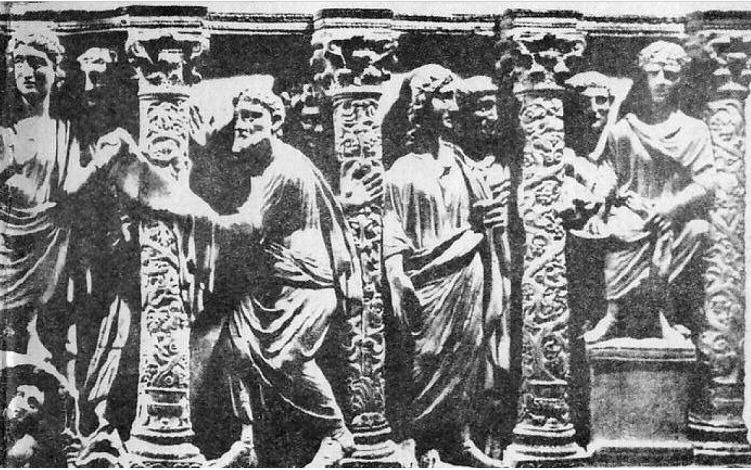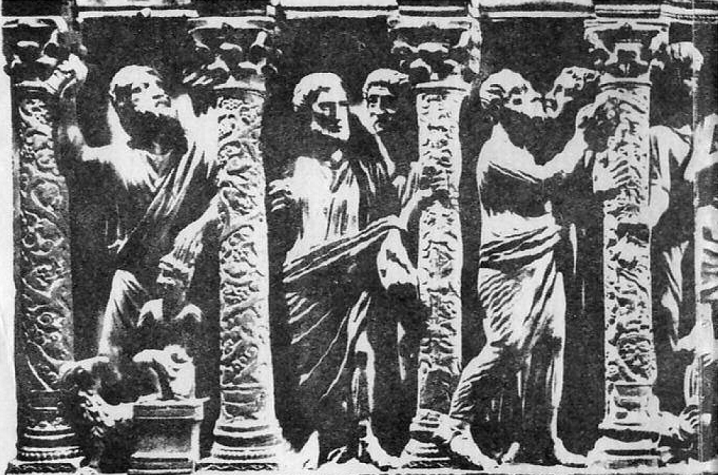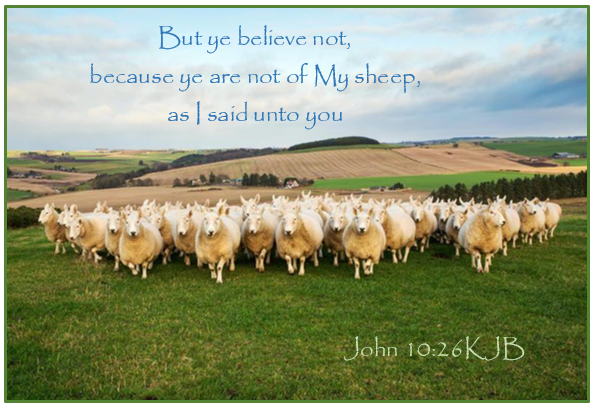Written by W.G. Finlay


Posted and image added by Jackie
CHAPTER 4 (first part)
ANTAGONISM BETWEEN PETER AND PAUL
There can be, of course, be very little doubt that there was antagonism between Peter and Paul and this statement is made with due consideration to the so-called approval and sponsorship of Paul by Peter recorded in verses fifteen and sixteen (of the third chapter, Jackie) of the Second Epistle of Peter. As professor Hendriks has shown, (see the February edition of The Covenant Message)
scroll down to page 12, Jackie
and as all theological textbooks confirm, no historian of the first two centuries of the Christian dispensation knew anything about a “Second Epistle of Peter” – a fact which would give credence to Peter’s charge recorded in the so-called pseudo-epistle which bears his name and in which he charges that others were using his name for their own purposes. Time and again one reads of attempts to reconcile the difference between Peter and Paul – differences which could be said to stem from Peter’s adamant stand on Israel and Paul’s equally adamant stand on incorporating the “Gentiles” irrespective of who they were.
In most modern text books, Peter is projected as being thoroughly obsessed with converting the Jews (=Israelites, Jackie) to Christ whereas as Paul is projected as being the “apostle to the Gentiles” i.e an apostle to everyone outside of Jewry. (=Israelites, Jackie) He had been present and heard the Lord Jesus Christ denounce the Jews (=the Pharisees, Jackie) as being of their “father the devil” – people who opposed the Truth, because it was the Truth,
- “Ye are of your father the devil, and the lusts of your father ye will do. He was a murderer from the beginning, and abode not in the truth, because there is no truth in him. When he speaketh a lie, he speaketh of his own: for he is a liar, and the father of it. And because I tell you the truth, ye believe me not”. (John 8:44,45),
people who would not hear God’s words “because they were not of God.”
He that is of God heareth God’s words: ye therefore hear them not, because ye are not of God. (John 8:47)
He had heard too the complete repudiation by the Lord in which the Jews were identified as not being His sheep – the sheep to Whom He had been sent
- “But ye believe not, because ye are not of my sheep, as I said unto you”. (John 10:26)
-how then could Peter as equated as the Apostle to the Jews? If he did concentrate all his efforts on converting the Jews, he would be in violation of the Commission given to him by the Lord. This erroneous idea arose because, as taught by the Lord.
- Think not that I am come to destroy the law, or the prophets: I am not come to destroy, but to fulfil. For verily I say unto you, Till heaven and earth pass, one jot or one tittle shall in no wise pass from the law, till all be fulfilled.” (Matthew 5:17,18)
Peter insisted on the continuity of the Law as given at Sinai i.e. National Constitutional Law, which people have assumed was practised by the Jews. As the Lord made abundantly clear, the Jews were not practising the Law given by Moses to Israel but a perversion of this which He called “the traditions of the elders” or “commandments of men”.
(So, the Law of Moses is not a jewish law, nor is the Torah jewish, or that Moses was a jew, as so often is claimed. Jackie)
We continue:
And honour not his father or his mother, he shall be free. Thus have ye made the commandment of God of none effect by your tradition. Ye hypocrites, well did Esaias (=Isaiah 29:13, Jackie) prophesy of you, saying,
- ”This people draweth nigh unto me with their mouth, and honoureth me with their lips; but their heart is far from me.But in vain they do worship me, teaching for doctrines the commandments of men”. (Matthew 15:6-9)
It was because Peter insisted on the continuity of the Law, people have naturally assumed that his mission was involved with the Jews, little realising that Israel and Jewry were poles apart and certainly not the same people.
That Peter and Paul were loggerheads cannot be doubted, for the controversy has found its way into records both religious and secular – an instance of which may be seen in an article produced in publication entitled History Today and in which the writer J.K. Elliot, attempts, to soften the rivalry between Peter and Paul, “The Acts of the Apostles which at face value appears to chronicle the events recorded in Paul’s letters attempts to soften this rivalry. This partly the result of the author’s attempt to show how similar Peter was to Paul, or rather Paul to Peter. Paul is consistently shown to be as good an apostle as Peter – and in many respects, the true successor to Peter as the main Christian evangeliser and missionary…..”
J.K Elliot then proceeds to indicate and enlarge on the theological tendencies at work in the record of the Acts, and wrote: “One of these is the attempt to remove the differences between the two leading figures in the early church. Actions, speeches and attributes of one man are transferred to the other. The author, writing from a pro-Pauline angle, has attempted to rehabilitate Paul in the minds of the readers whose church may well have been inclined to promote the memory of Peter, so that by robbing Peter to pay Paul, the author has in effect diminished Peter’s unique role in a far more subtle way than Paul himself did in his letters. Both Paul himself and the author of Acts have similar aims, even if both have a different style and approach, and these are to reduce the standing of Peter, as representing the Jerusalem church and argue the validity of “the Gentile church.”
In analysing the article by J.K. Elliot, which was written from a very pro-Pauline stance, one cannot miss two outstanding features which dominate the writing. The one is contention, that the author of the Acts – which most theologians agree was Luke, Paul’s particular disciple – transferred “the action speeches and attributes of one man to the other” which certainly makes it very difficult to know who did or said what in the record of the Acts. Others, too, appear to have picked up similar thoughts for in a work by Rabbi Richard Rubenstein and under the title My brother Paul, the Rabbi quotes a work, Galatians (St Paul Publications: London 1969), in which John Bligh is reputed to have challenged the account in Acts 10:1-16 in which Peter was told in a vision – the vision of the sheet on which all kinds of animals, wild beasts, creeping things and fowls of the air were depicted – Peter was told to kill and eat the unclean things forbidden in the Law in response to which, a voice said: “What God hath cleansed that call not thou common”. According to John Bligh, it was Paul and not Peter who had this vision – a contention which has been vigorously contested by those who hold that every word in the Bible is the product of Divine Inspiration.
There can, of course, be very little doubt in the minds of those who still manage to think for themselves, that regardless of John Bligh’s theory, the whole story of the “sheet vision” is highly suspect with an objective which is all too apparent. In his writing, Luke indicated that the vision was analogous and that it was intended to convince Peter that his “prejudice” against people other than Israel, was contrary to the dictates of the new dispensation – hence Peter’s reported reaction to the “vision”: “God hath shewed me that I should not call any man common or unclean” (Acts 10:28). If this account is valid, the Lord Jesus Christ was surely very remiss in not cancelling His Commission to His Apostles when He directed them to the “lost sheep of the house of Israel”. However, when all the facts are weighed up, the use of the “sheet vision” to covince either Peter or Paul; of the universalism in the “new dispensation” is seen as a gigantic hoax. In the Old Testament, the LORD provided Israel with the types of “clean” and “unclean” animals (Deuteronomy 14:3-20) – the “clean” belong good for food, while the “unclean” were not. One should not think of the “clean” and “unclean” status as deriving from religious sources, as one find the same classification in the pre-Flood era – long before there was a priesthood. (Genesis 6:19-22 and 7:2). The pig, for instance, was classified as “unclean” (Deuteronomy 14:8)- not because of prejudice or preconceived religious notions, but because of its physiological structure which was such that it could function in the scavenger role for which it had been created. In what way and through what mechanism has that role been changed? If one looks at the pig today, one sees that it is riddled with internal parasites – Coccidia; the common liver fluke; the lung fluke; pork bladder worm; the thin-necked bladder worm; the hydatid stomach worms; the intestinal thread worm; the large intestinal round worm or ascarid; the thorn-headed worm; nodular worms, the whip worm, the swine kidney worm; the lung worms; and trichina. The facts of modern life without ecclesiastical opinion show that “unclean” is still “unclean” and that the analogy of the sheet vision was the by-product of Pharisaic propaganda of proselytism.
J.K Elliot, is his observation that “…… the author Luke has in effect diminished Peter’s unique role in a far more subtle way than Paul; himself did in his letters. Both Paul himself and the author of Acts have simliar aims, even if both have a different style and approach, and these are to reduce the standing of Peter, as representing the Jerusalem church and argue for the validity of the “Gentile church.” There can be very little doubt that this observation is based on a careful study of The Acts and Paul’s epistles – an instance of which may be seen in the New English Bible Translation of Galatians 2:6-12. In this Paul states that while God had entrusted Peter with the “Gospel for the Jews”, he, Paul, had been entrusted with the “Gospel for the Gentiles” – a statement which has no foundation, whatsoever. Where and when did the Lord Jesus Christ entrust Peter with the “Gospel for the Jews”? If one recalls the Lord’s use of parables to hide the Truth from the Jews.
- For this people’s heart is waxed gross, and their ears are dull of hearing, and their eyes they have closed; lest at any time they should see with their eyes, and hear with their ears, and should understand with their heart, and should be converted, and I should heal them. (Matthew 13:15)
plus His denial that they (=the jews, Jackie) were His sheep,
“But ye believe not, because ye are not of my sheep, as I said unto you.” (John 10:26)
it must be admitted that Paul was very wide of the mark in associating Peter and his works with the Jews. Further, when Paul claimed his role as the “apostle of the Gentiles”.
- “Then Paul and Barnabas waxed bold, and said, It was necessary that the word of God should first have been spoken to you: but seeing ye put it from you, and judge yourselves unworthy of everlasting life, lo, we turn to the Gentiles. For so hath the Lord commanded us, saying, I have set thee to be a light of the Gentiles, that thou shouldest be for salvation unto the ends of the earth”. (Acts 13:46,47)
– the word “Gentiles” here being according to the Pharisaic interpretation which mean all non-Jewish nations – one finds Paul appropriating to himself the role of the Lord Jesus Christ. If one reads Paul’s quotation from the Old Testament, it will be seen to have been taken from the forty-second and forty-ninth chapters of Isaiah’s writings, which without a shadow of a doubt pointed to the Lord.
However, be that as it may, in continuing with the diminishing of Peter’s role, one finds Paul using language of disparagement when he wrote of Peter, James and John, the three men who the Lord singled out for special education.
- “And after six days Jesus taketh Peter, James, and John his brother, and bringeth them up into an high mountain apart, And was transfigured before them: and his face did shine as the sun, and his raiment was white as the light.And, behold, there appeared unto them Moses and Elias talking with him”. (Matthew 17:1-3)
- “And he suffered no man to follow him, save Peter, and James, and John the brother of James.And he cometh to the house of the ruler of the synagogue, and seeth the tumult, and them that wept and wailed greatly. And when he was come in, he saith unto them, Why make ye this ado, and weep? The and the mother of the damsel, and them that were with him, and entereth in where the damsel was lying. And he took the damsel by the hand, and said unto her, Talitha cumi; which is, being interpreted, Damsel, I say unto thee, arise. And straightway the damsel arose, and walked; for she was of the age of twelve years. And they were astonished with a great astonishment. And he charged them straitly that no man should know it; and commanded that something should be given her to eat”. (Mark 5:37-43)
- “And when James, Cephas, and John, who seemed to be pillars, perceived the grace that was given unto me, they gave to me and Barnabas the right hands of fellowship; that we should go unto the heathen, and they unto the circumcision”. (Galatians 2:9)
This is followed by the story of Peter’s two-facedness:
- “But when Peter was come to Antioch, I withstood him to the face, because he was to be blamed. For before that certain came from James, he did eat with the Gentiles: but when they were come, he withdrew and separated himself, fearing them which were of the circumcision”. (Galatians 2:11,12)
The point to determine here is; was Peter as hypocritical as Paul made out, or was it another attempt at diminishing Peter’s reputation among the people? There can be, of course, very little doubt that he, Paul, on his own admission, was “all things to all people” (1st Corinthians 9:22) and attempted to convey the notion that Peter indulged in the same practice. It should, of course, be noted that along these lines as totally alien to the teaching of the Lord Jesus Christ.
(Are we catching this, ladies and gentlemen? Saul badmouthing and blaming Peter that he was holding on to the Teachings taught by Yahshua Christ. And thereby saying that he, Saul, is above Yahshua Christ, WHO is Yahweh God, Jackie.)
to be continued Part 5, second part of chapter 4

